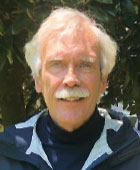With 2020 being the 50th anniversary of Earth Day (to be formally celebrated in October), Mother Nature has given us a harsh new wake-up call: the coronavirus pandemic. We are reminded of our intimate connections with all life on Earth. Getting too close to other species unfortunately led to this new deadly scourge.
The pandemic is everywhere and immediate. The grim daily statistics of death, reflected in graphs and stark photographs, thrusts us into a new, threatening reality. The pandemic definitely has our attention. Yet, there is another even greater and far deadlier threat: the climate crisis and all its implications.
Distant threats seem unworthy of our attention. This is especially true when one lives paycheck to paycheck. However, my journey to gradual understanding of the deeper threat of global warming may help to make that threat more palpable.
I reflect back to my first Earth Day. On that spring day, a group of students at my college in Tennessee were galvanized to action. We organized a clean-up of a winding mountain road that had been severely trashed. We collected 14 truckloads of trash. It was a thrilling start.
In 1970 we were aware of pollution and the ominous dangers that Rachel Carson had predicted in The Silent Spring. At that time, our focus was on visible pollution. Our hearts were in the right place, but we did not fully grasp the unseen dangers of greenhouse gases. CO2 and other greenhouse gas accumulation would create rising heat. Incomplete combustion would disseminate very small particulates with devastating effects on health. As is well known, the rise of global temperatures from 1750 has been 1 C or 2.7 F and CO2 levels have risen 40%. These changes might seem small, but the effects on climate have been considerable. Think about the drought and heat impacts on Australia this year. According to the World Health Organization, small particles and other airborne pollutants have caused more than 90% of the inhabited world to have air quality that is unhealthy.
Many in the United States and globally have been quite slow to acknowledge the reality and immediacy of climate change. Thinking back, I realized that what made me a latecomer to climate awareness is related to where I grew up. I grew up in Baytown, Texas, in the 1950s, where oil was king, and the world’s largest oil refinery was producing gasoline. My father and all his friends worked for the oil industry. The fossil fuel energy, which is actually stored sunlight, powered everything: airplanes, cars, boats, lawnmowers, and much more. I loved filling my homemade go-cart and lawnmower with sweet-smelling leaded gas. Everyone loved oil in Texas.
In 1894, Svante Arrhenius had predicted that CO2 levels derived from fossil fuel combustion would increase our temperatures by 3 C to 4 C. He was uncannily accurate. Since 1970 scientists from government, academia, and the private sector studied the phenomena and reconfirmed these predictions. But the fossil fuel industry, driven by profit motives, introduced doubt through confounding propaganda. The industry has spent millions to cloud the truth about climate change.
I previously rationalized that extreme weather was a natural aberration. Yet I developed ominous forebodings after seeing “An Inconvenient Truth” based on the book by Al Gore and learning about the European heatwaves that killed 70,000 in 2003. Two years later, Katrina struck with a storm surge of more than 26 feet, and more than 1,200 died in New Orleans. Since then, a steady cascade of extreme weather has followed.
In 2017 everything came together for me in a big climate wakeup call when I read Peter Brannen’s The Ends of the World. At that time we had joyful news—the birth of our first grandchild. Brannen demonstrated that cycles of increased CO2 multiple times in Earth’s history and the resultant increased global temperatures had rendered the Earth so hot that mass extinctions occurred. Indeed five mass extinctions have happened over the course of Mother Earth’s life. Brannen also showed how elevated CO2 from before the Industrial Revolution created the conditions for the sixth major mass extinction.
Ironically, at the time of my granddaughter’s birth, increasing heat became a sudden reality to me. Surely, I realized, the increase in global warming would have dramatic impacts on all future generations. I asked myself, how would my grandchild fare during her lifetime?
I dropped my attachment to fossil fuels. Instead, I now work on activist projects with my colleagues to understand more about climate change and how it will impact us all.
The good news is that we can do much to mitigate global warming and the impacts of the climate crisis, just as we are addressing the COVID-19 pandemic, but we must act immediately and decisively. Personal choices to address our own practices and carbon footprints will help. Just as important as handwashing and physical distancing are to managing COVID-19, individual and collective actions to decrease global warming are necessary. Such behaviors include eating plant-based diets, using public transportation and stairs rather than elevators, taking fewer airplane trips, turning off lights at night, recycling, and using clean energy sources.
Most important, our biggest impact will be seen through collective work for political, economic, and societal changes. We need leaders who can help us create and sustain a healthier Earth where our children and grandchildren will thrive. In our relationship with nature, we can, as the Shaker hymn says, “come down to where we ought to be.”
Let us all work together to protect ourselves from COVID-19 and the slower but more dire mega-disaster of the climate crisis. Our grandchildren will love us for this, and we owe it to them. ■


